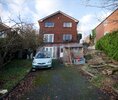- Joined
- 27 Jan 2008
- Messages
- 24,556
- Reaction score
- 2,812
- Location
- Llanfair Caereinion, Nr Welshpool
- Country

When the solar panels were fitted, the boiler was taken off the RCBO supply and connected to the new UPS, with no RCD protection, I popped out and got a RCD FCU, however when the boiler fired, it tripped, this was winter, so not the time to mess around, so put the non RCD FCU back.
I noted before the work was done, total earth leakage for house around 26 mA, and after the work was done, around 8 mA, so it does seem likely I have a 18 mA leakage on boiler. No easy point to put my clamp around to measure.
So the question is, do oil boilers 25-year-old leak to earth anyway? Is there something with the ignition system which means it will always lead some current to earth? There is cabling to pumps, motorised valves, and the local room thermostat, but the main room thermostat (Nest Gen 3) is 12 volt SELV so no long cable runs buried in the wall. So inclined to leave it without RCD protection, after all I have a compliance certificate saying all complies. So the only person who could be in danger is the boiler service engineer.
I am undecided, should I look for the earth leakage, or should I simply say not my call, I did not remove the RCD protection so why should I worry, as it is, it's less likely to fail. Fact that old RCBO did not trip, it could be the RCD FCU is too sensitive, my RCD tester died.
Thoughts please.
I noted before the work was done, total earth leakage for house around 26 mA, and after the work was done, around 8 mA, so it does seem likely I have a 18 mA leakage on boiler. No easy point to put my clamp around to measure.
So the question is, do oil boilers 25-year-old leak to earth anyway? Is there something with the ignition system which means it will always lead some current to earth? There is cabling to pumps, motorised valves, and the local room thermostat, but the main room thermostat (Nest Gen 3) is 12 volt SELV so no long cable runs buried in the wall. So inclined to leave it without RCD protection, after all I have a compliance certificate saying all complies. So the only person who could be in danger is the boiler service engineer.
I am undecided, should I look for the earth leakage, or should I simply say not my call, I did not remove the RCD protection so why should I worry, as it is, it's less likely to fail. Fact that old RCBO did not trip, it could be the RCD FCU is too sensitive, my RCD tester died.
Thoughts please.

